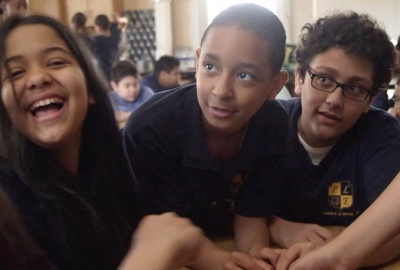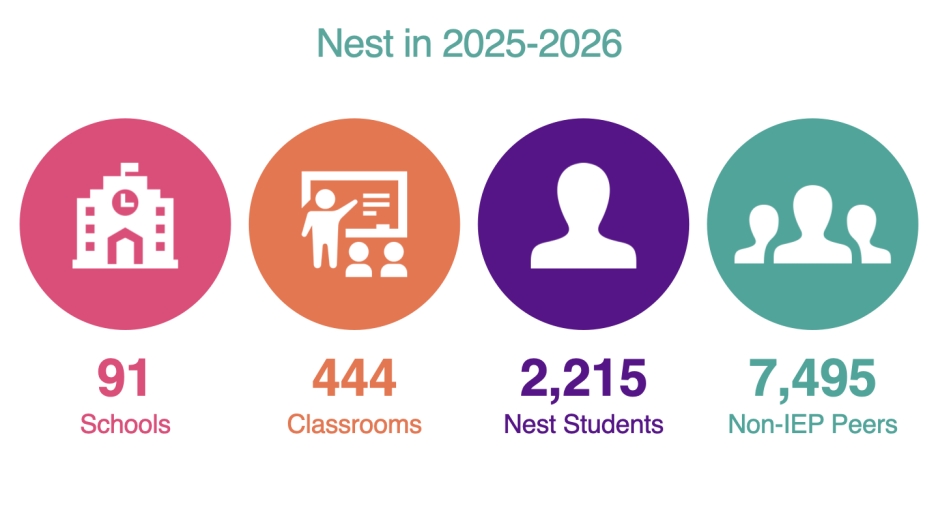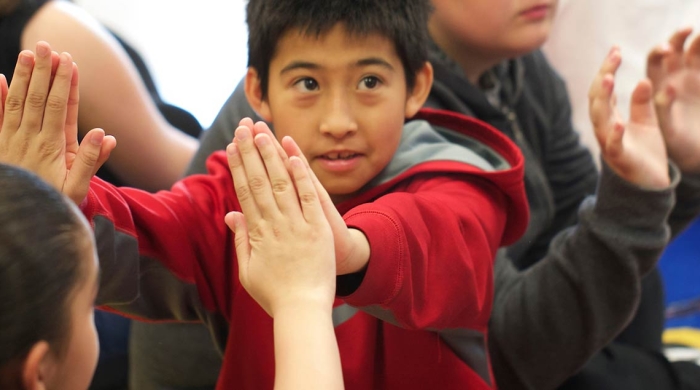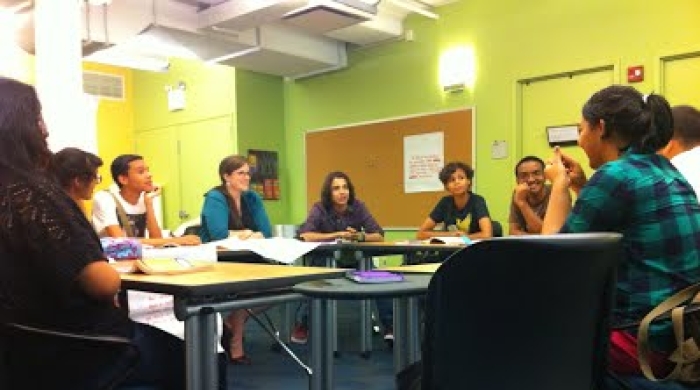
The Nest Support Project is one of several community-focused programs serving special populations hosted by NYU Steinhardt School of Culture, Education, and Human Development. The goal of the Nest Support Project is to partner with public schools to establish inclusive cultures and advance the development and implementation of educational practices for autistic learners.
The Nest Support Project provides training, professional development, and on-site consultation for teachers, therapists, and administrators, and workshops and a newsletter for Nest families. Other activities include research, presentations at national professional organizations, and articles and other publications on relevant topics.
NYU's partnership with New York City’s Public Schools (NYCPS) and Hunter College’s School of Education began in 2001 to fill a gap in the programs the NYCPS offered for children on the autism spectrum. The fruit of that collaboration was the new ASD Nest program, piloted at PS 32 in Brooklyn in September 2003. Its goal was and is to help these children learn how to function well academically, behaviorally and socially in school and in their community.
Now, in the 2025 - 2026 school year, the Nest program in New York City serves:
- more than 2,215 Nest students
- in over 444 fully inclusive classrooms
- in 91 schools from kindergarten through grade 12
The NYCPS and individual Nest schools provide contracts to support and facilitate the development and expansion of the Nest program, as well as to provide professional development for staff members of Nest schools.
We acknowledge with gratitude the early support of the FAR Fund, Independence Community Foundation (now Brooklyn Community Foundation), Overbrook Foundation and Tides Foundation, and the ongoing support of the FAR Fund for parent support activities.
The collaborative team of DOE educators who initially developed and nurtured the Nest Program with the guidance of Professor Shirley Cohen of Hunter College and Dorothy Siegel of NYU were: Ruth Blankiet, David Cohen, Carmen Farina, Sherry Koslov, Ann Marie Lettieri-Baker and Steve Rosen. Terry Feuer and Linda Wernikoff provided invaluable support as the program got off the ground.

The Nest Model Mission
The Nest Model is a fully inclusive therapeutic environment designed for autistic students who are able to do grade-level academic work when provided the necessary support. This is a strengths-based model utilizing positive support strategies, targeted instructional strategies and specialized social interventions to make inclusion work well for all learners in the classroom. The Nest school and district provide the necessary structures for the model, such as; including smaller class size, co-taught classes, regular interdisciplinary team meetings to promote consistency across all settings, and a strong home-school collaboration.
Elementary School Model
Supports school-age Autistic students in both developing academic skills and building their social competencies.
Middle School Model
Helps strengthen self-advocacy skills to lay the groundwork for independent functioning in their educational careers.
High School Model
Helps Autistic adolescents and emerging adults learn how to function well academically, behaviorally and socially, and become ready to attain their full, unique potential as competent, independent and happy adults.
The Nest Model Overview
Nest is a school inclusion model for Autistic students, in which Autistic students are educated in their neighborhood school alongside their general education peers. Educators teach the general education curriculum, using specialized supports drawn from evidence-based and promising practices. Students are helped to develop competence in their social and behavioral functioning, in order to ultimately realize their full, unique potential as independent and happy adults.
Below are the core beliefs, structures, and practices that comprise the Nest Model Framework.
Classroom Supports
Built on a foundation of solid instructional practice, Nest classroom supports are devised to help Autistic students and benefit general education students
- Class-wide Strategies: Whole-class social, sensory, behavioral, and academic strategies form a foundational level of support; individualized strategies are developed as necessary for students
- Integrated Therapeutic Supports: Teachers collaborate with therapists to devise strategies that help to create a therapeutic classroom environment
- Landmark Documents: Documents outline the use of classroom strategies and serve as a reference and resource for teachers, therapists, and administrators
- Social Development Intervention: Speech therapists and classroom teachers co-lead specialized small-group focus time; teachers generalize supports across the day
Collaborative Structures
Collaboration takes place through a series of structures with a variety of stakeholders, at all levels of the model
- Co-teaching & Co-planning: Classroom teachers co-plan and deliver instruction using a variety of co-teaching models
- Team Meetings: After-school meetings are held weekly, with all relevant staff and administrators, to discuss program business and case conference each student to devise comprehensive support plans
- Nest Coaches: Nest Coaches in schools receive additional training and support to become an internal point person for the Nest team, supporting teachers and students, and creating cohesion in the Nest team
- Nest Cluster Teacher: A Nest-trained teacher supports students in out-of-classroom experiences, such as lunch, recess, and special subjects, like art, music, and gym
- Home-school Connection: Regular communication takes place with families, through home-school notebooks and support from a social worker or guidance counselor, parent meetings, and parent workshops
- Outside Support: Nest consultants help schools implement the model, problem-solve challenges, and work to develop schools’ internal capacity
System-wide Structures
Nest schools, under the leadership of their principals, commit to implementing the model; districts commit to funding for the program, for training staff, and for other school system supports
- Reduced Class Size & Appropriate Ratios: Smaller classes create a comfortable learning environment for students
- Training & Professional Development: Pre-service and in-service training prepares all teachers, therapists, and administrators to work with Nest students
- Committed Administration: Principals and assistant principals are the school-level stakeholders who secure buy-in from staff, families, and the broader school community
- Inclusive Classrooms: Nest classes are co-taught integrated inclusion classrooms
Philosophical Foundation
Several shared beliefs serve as the foundation upon which all structures and practices are built
- True Inclusion: Inclusion is not a location; students in Nest are recognized as full contributing members to the class and school community, throughout the entire day
- Collaboration: The real expert in any school is the team; in Nest, collaboration exists between and across disciplines, and the transdisciplinary team of teachers and related service providers
- Understanding of Autism: Students with ASD think and learn differently than other students; accordingly, all Nest practices stem from a recognition of students’ neurological differences which manifest as differences in social understanding, sensory sensitivity, self-regulation challenges, etc.
- Focusing on Strengths: People are more motivated when they do something they’re good at; in Nest, students’ strengths and interests are honored and incorporated, instead of focusing exclusively on areas of deficit
- Individual Supports: If students don’t learn the way we teach, then we must teach the way they learn; In Nest, teams collaborate to devise individualized supports for struggling students
- Therapeutic Environment: Students’ home base is their classroom; Nest classrooms utilize supports typically provided by outside specialists so students have a safe environment where they can comfortably interact with their peers
- Social Development: Social development is essential to students with ASD; in Nest, social is supported through building of competence, developing relationships, and addressing internal motivation, which support independence and self-advocacy
- Positive and Proactive Support: Skill building through positive reinforcement leads to meaningful, long-lasting change; the Nest uses a PBS framework for all behavioral supports
- Family Involvement: Parents and guardians provide invaluable knowledge about their children; in Nest, families are part of the team, involved in decision-making, updated regularly about changes and progress, and provided with resources such as targeted workshops and newsletters




